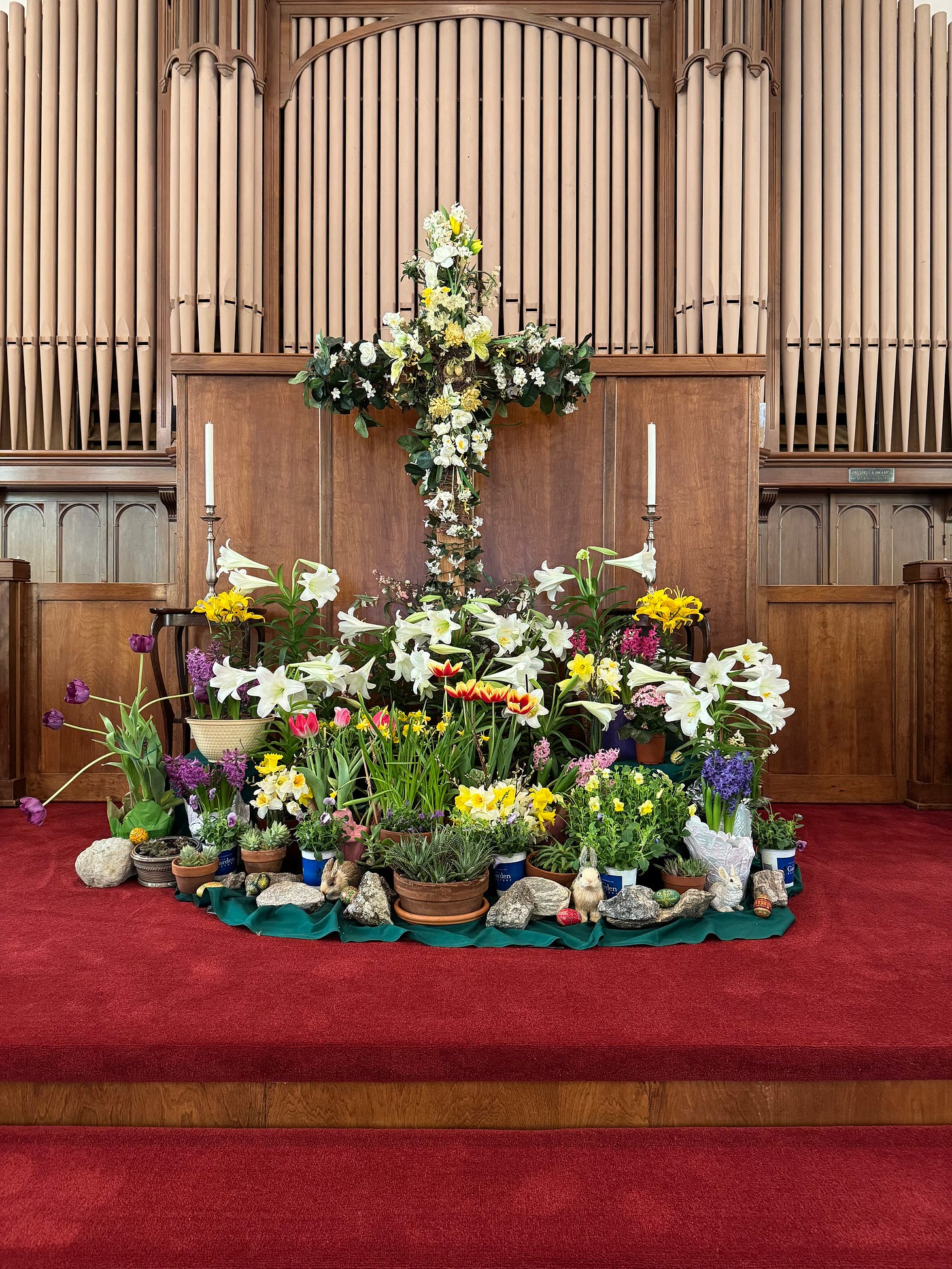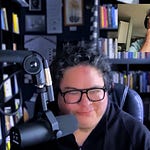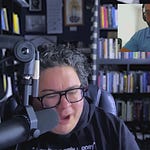Dear Substack Community: I am choosing to rise in the face of collapse and I invite you to join me! Here is my sermon from today. It’s the 10 year anniversary of me finishing my PhD. I feel like now I might have a better perspective on things being this far out. I have a long ways to go, but I am trying my best to return to my purpose and live a life of purpose in the face of accelerated harms against the underside of history. I’m sorry for the ways I have not been in right relationship with people, and I am turning toward the work of repairing myself, so I can repair the world. I want us to do this work together as we face our different forms of collapse.
Happy Easter to those who celebrate! Happy 4/20 to those who celebrate! Let’s step into the fullness of our collective becoming by returning to the work of changing ourselves, so we can change the world. I’ve needed this winter to go underground and compost all the little things that trip me up and create barriers to belonging and connection. May the signs of spring compel us into another possible world—into dreaming with one another and coloring outside the lines!
May it be so!
Paz, —RCE+
🌅 Sermon Title: “Still Rising: Resurrection in the Age of Collapse”
Scripture: John 20:1–18
Today is a big day in the life of the church!
It is Easter!
It’s considered a High Holy Day in the Christian Tradition!
We remember the story of the risen Christ.
I want to remember another story.
On April 20, 2015 at 8am, I defended my PhD dissertation in Denver, CO.
4/20 is a big holiday in Colorado, and I was up early to defend my 300 page dissertation.
I have always been told that academia will accelerate harm against those who find themselves in compromised conditions, and I didn’t believe what I was told.
I didn’t believe that the very system that I had entrusted with my ideas and my body would betray me.
I had left the church years before because of how it continued to harm me, and I entered into a different kind of religiosity. It’s called academia and the waters of academia are the same waters that exist in every other system, non-profit, church, mosque, and any other grouping of people who are seeking to be better than what they’ve encountered, and the waters are so toxic that it becomes hard to recognized each other.
Stay with me here.
It’s resurrection Sunday and the command that Jesus gave us on Thursday was to eat the bread and drink the wine and continue that practice, so that we can remember ourselves and one another.
Yet, our systems force us to betray ourselves. And, we forget ourselves and we are essentially dismembered and unable to repair ourselves.
Yet, today, I woke up put on my pink shirt for Cori Burdick—she liked pink and it was her birthday this week—I didn’t get to meet her, but I think she would have helped me put myself back together, like Alfred is helping me do.
Today is Resurrection Sunday, a day when Christians celebrate the resurrection of Christ. There is much debate on the theology of resurrection, and while many churches are preaching this Sunday that Jesus walked out of the tomb, I want to pause for a minute and remember that it was not about walking out of the tomb.
It was about recognition.
10 years ago when I defended my PhD dissertation, I hardly recognized myself. I had become so attached to this one particular system that I was a robot.
In fact, years later after my 2nd book came out, I gave a TED Talk about being a floating head.
I am still on that journey of coming home to myself and on this resurrection day I better am able to recognize myself and I want to ask you the same question: do you recognize yourself?
There’s still time for you to come home to yourself, as I am learning.
We are still learning how to make room or one another.
When I became your pastor, I didn’t know how to tell you who I was! I didn’t know how to tell you that the people I have been pastoring are people who have left the church and are gingerly walking back toward some semblance of a ritual life, but it doesn’t look like what we do on Sundays. I didn’t know how to tell you that my quiet revolution is grounded in the politics of togetherness. I’m sorry for the ways I have failed you in these early years of our time together.
Rick Stephens has given me the language of calibration. I am learning to calibrate being here. Thank you, Rick, for that langauge.
I didn’t know how to tell you that since 2008, I’ve been a digital pastor. I nurture people who have left the church and are still finding a way to return to themselves.
I didn’t know how to articulate this, because I was having a hard time recognizing myself.
I was scared to tell you what I have encountered and as a result I have alienated people and maybe caused people not to feel welcome here and that is the last thing I have wanted people to feel and experience with me.
So, on this resurrection Sunday, I am choosing to rise and I want to ask you to rise with me to nurture this church community in a way that calls forth our most perfect virtues that we embody together in the work of becoming.
We have learned these virtues from Jesus these past several weeks. Are we able to rise in the face of the collapse that we witness? Political collapse, economic collapse, ecological collapse?
Are we able to rise in the face of violence, even when the systems we are in cause us to be compromised?
Are we able to rise and narrate the impossible on this day?
⸻
There are many ways to rise.
And not all of them look like victory.
Some risings begin in the dark—
in tombs, in borderlands, in protest encampments,
in the quiet refusal to bow to despair.
⸻
This morning, the tomb is empty,
but the wounds are not gone.
The empire is still intact.
The grief is still fresh.
And yet—
Christ is risen.
Not in the old economy of domination,
but in the wisdom economy of communion.
Not in the spectacle of conquest,
but in the stillness of a gardener calling a woman by name.
⸻
Mary Magdalene doesn’t find resurrection with certainty.
She finds it by staying.
She weeps. She watches. She waits.
She is not applauded for her hope.
She is remembered for her presence.
And in that fragile, trembling presence—
she hears it:
“Mary.”
This is not just the return of a body.
It is the re-membering of love in a world that forgot.
⸻
We live in an age where forgetting is encouraged—
forgetting our stories,
forgetting our dignity,
forgetting the wisdom of the earth,
forgetting what it means to belong.
But resurrection is an insurgent remembering.
It composts empire’s logic into the soil of imagination.
⸻
Kate Harris, in her prophetic work The Poet’s Rebellion, names this moment as a turning.
A time when poetic imagination becomes not luxury, but necessity.
She writes that “in the age of collapse, the poem is the resistance.
The body is the text.
And memory is the soil from which all futures rise.”
Easter is not a return to what was.
It’s the first breath of what might still be.
This is not the triumph of empire.
This is the rebellion of imagination.
This is the age where we remember
what the systems tried to make us forget:
That the world is still alive.
That the tomb is not the final word.
That love can rise again—through us.
⸻
The wisdom economy does not deal in coins or conquests.
It is the economy of:
• interdependence, not extraction
• tenderness, not transaction
• mutual liberation, not meritocracy
Resurrection is its currency.
And you—beloved—you are its living proof.
⸻
We are still rising.
Every time we choose presence over perfection,
tenderness over certainty,
soil over supremacy—
we rise.
Every time we refuse the easy cynicism of empire
and practice the slow re-membering of love—
we rise.
We rise in bread shared, in arms opened, in futures imagined.
We rise when we recognize that resurrection isn’t a spectacle.
It’s a seed.
⸻
So rise, not because the world is fixed,
but because Christ is already sowing a new one.
Rise, not as consumers of resurrection,
but as its poets, its gardeners, its conspirators.
Rise, because the tomb has been breached
and the imagination of God has been loosed in the world.
And Mary is still preaching.
And Jesus is still whispering names.
And the soil is still breathing.
Christ is risen—
and so are we.
Alleluia.













